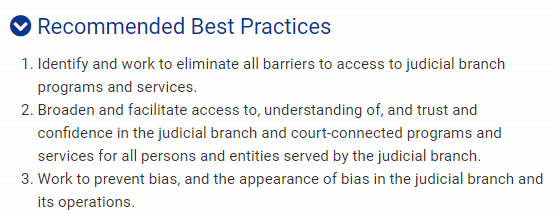Jury Service and Fairness: Understanding the Challenges of Implicit Bias

The Judicial Council announces the release of a 10-minute educational video, Jury Service and Fairness: Understanding the Challenges of Implicit Bias. The production aligns with recommended best practices for removing barriers to access and fairness, including:

Implicit bias, also known as unconscious bias, can impact the way people interpret and process information without ever intending to—or even realizing it. Implicit bias can also cause people to hold assumptions or form stereotypes, which can influence their thoughts and decisions.
>
Jurors bear the responsibility of evaluating evidence, assessing the credibility of witnesses, and applying these facts alongside the law to reach a verdict in thousands of criminal and civil cases each year.
“Everyone has a right to a trial by jury of their peers,” California Chief Justice Patricia Guerrero says in the video. She advises jurors, “Because your role is so important, we believe it’s vital to provide you with this information about implicit bias so that you can discharge your duty as a juror fairly and impartially, ensuring that any assumptions, stereotypes, and preconceptions do not influence your decision.”
Jury Service and Fairness: Understanding the Challenges of Implicit Bias was originally developed by the non-profit Perception Institute in 2021 and was adapted by the Judicial Council in partnership with the California Judges Association.
In addition to the new video on implicit bias, the council also updated California’s juror orientation video Justice For All: Orientation to Jury Service, which includes a new introduction and closing remarks by Chief Justice Guerrero. Both videos align with the Strategic Plan for California's Judicial Branch and will be shown by trial courts to the approximately 9 million jurors called for service every year.
In September 2020, the Work Group on the Prevention of Discrimination and Harassment, and with input from other Judicial Council advisory bodies, the Judicial Council's Center for Judicial Education and Research (CJER) Advisory Committee proposed amending rule 10.469 of the California Rules of Court. The amendment supported making education on unconscious bias mandatory for judicial officers. The Judicial Council approved the recommendation, effective January 1, 2022. (Watch)


